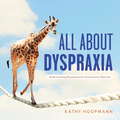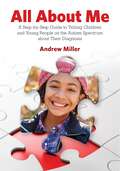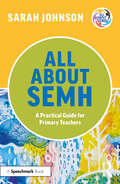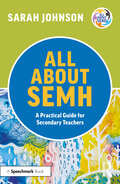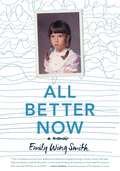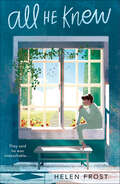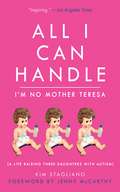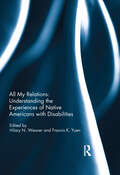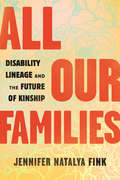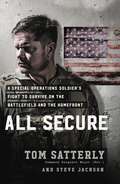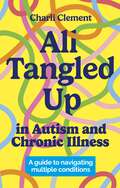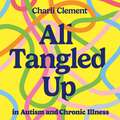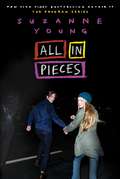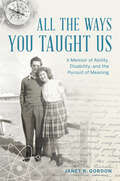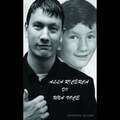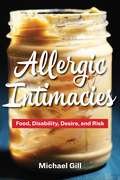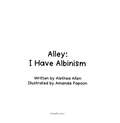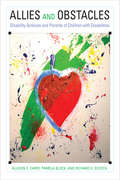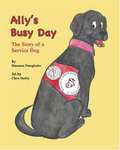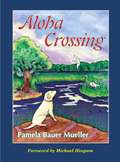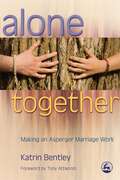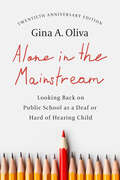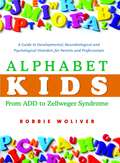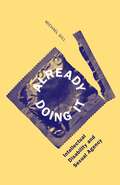- Table View
- List View
All About Dyspraxia: Understanding Developmental Coordination Disorder
by Kathy HoopmannAll About Dyspraxia follows in the best-selling footsteps of Kathy Hoopmann's All Cats are on the Autism Spectrum and All Dogs have ADHD. Through engaging text and full-colour photographs, this book shows how people with dyspraxia see and experience the world and highlights the unique characteristics that make them special.A perfect introduction to dyspraxia for those recently diagnosed with the condition, as well as their families, friends, and the people who work with them. People with dyspraxia will also appreciate the book for the way it shares their perspectives on life with care and gentle humour.
All About Me: A Step-by-Step Guide to Telling Children and Young People on the Autism Spectrum about Their Diagnosis
by Andrew MillerBased on direct work with over 250 individual children, Andrew Miller wrote this book in order to provide parents and professionals with information, tools and guidance to help introduce children to autism in the absence of specialist support. This in-depth guide describes the practicalities of disclosure, including when to tell, who should do it and what they need to know beforehand with strategies to tailor your approach as every child's experience will be different. Step-by-step instructions detail how to deliver the programme and produce with a child a personalised booklet containing information about their personal attributes and their autism. These booklets and follow-up material help make disclosure a positive and constructive experience for everyone. Accompanying material can be downloaded online including questionnaires, examples of children's booklets and flexible templates.
All About SEMH: A Practical Guide for Primary Teachers (All About SEND)
by Sarah JohnsonAll About SEMH is an accessible and informative guide for primary school teachers, designed to increase their understanding of social, emotional and mental health needs, and to enhance their toolkit with practical, evidence-informed strategies to support children in their care. The book unpicks key terminology and debunks myths and misconceptions, enabling teachers to more easily understand some of the challenges for learners with SEMH needs. It then explores a range of key areas, including anxiety, attachment, bullying and self-harm, and focuses on practical strategies and adaptations that can be made in every classroom. All About SEMH includes: A comprehensive introduction to social, emotional and mental health needs, and the surrounding terms and policies. Practical strategies tailored to different conditions to help provide targeted support to primary school learners. Case studies and worked examples to illustrate points in the book, supporting behaviour recognition and developing reader understanding. Discussion on different behaviour patterns in school and at home, with the voices of parents of children with SEMH woven throughout. Easy to dip in and out of chapters with signposting to further research, resources and support. This accessible guide is a valuable resource to empower primary educators, increasing their knowledge and understanding of SEMH, and providing a range of practical strategies to support every learner in their class. It will be essential reading for all primary school educators, SENCOs and parents who are supporting children with SEMH needs.
All About SEMH: A Practical Guide for Secondary Teachers (All About SEND)
by Sarah JohnsonAll About SEMH is an accessible and informative guide for secondary school teachers, designed to increase their understanding of social, emotional and mental health needs, and to enhance their toolkit with practical, evidence-informed strategies to support learners in their care. The book unpicks key terminology and debunks myths and misconceptions, enabling teachers to more easily understand some of the challenges for learners with SEMH needs. It then explores a range of key areas including anxiety, depression, bereavement, obsessive-compulsive disorder and self-harm, and focuses on practical strategies and adaptations that can be made in every classroom. All About SEMH includes: A comprehensive introduction to social, emotional and mental health needs and the surrounding terms and policies. Practical strategies tailored to different conditions to help provide targeted support to secondary school learners. Case studies and worked examples to illustrate points in the book, supporting behaviour recognition and developing reader understanding. The difference between children’s behaviour at home and at school are examined, and the voices of parents of children with SEMH are woven throughout. Guidance on safeguarding and when to ask for additional support regarding concerns such as drug abuse or child exploitation. Easy to dip in and out of chapters with signposting to further research, resources and support. This accessible guide is a valuable resource to empower secondary educators, increasing their knowledge and understanding of SEMH, and providing a range of practical strategies to support every learner in their class. It will be essential reading for all secondary school educators, SENCOs and parents who are supporting children with SEMH needs.
All Better Now
by Emily Wing SmithI ask myself: how am I living still? And how I ask it depends on the day. All her life, Emily has felt different from other kids. Between therapist visits, sudden uncontrollable bursts of anger, and unexplained episodes of dizziness and loss of coordination, things have always felt not right. For years, her only escape was through the stories she'd craft about herself and the world around her. But it isn't until a near-fatal accident when she's twelve years old that Emily and her family discover the truth: a grapefruit sized benign brain tumor at the base of her skull. In turns candid, angry, and beautiful, Emily Wing Smith's captivating memoir chronicles her struggles with both mental and physical disabilities during her childhood, the devastating accident that may have saved her life, and the means by which she coped with it all: writing.
All He Knew
by Helen FrostA 2021 Scott O'Dell Award WinnerA Society of Midland Authors Winner in Children's FictionA Bank Street Best Book of the Year 2021A novel in verse about a young deaf boy during World War II, the sister who loves him, and the conscientious objector who helps him. Inspired by true events.Henry has been deaf from an early age—he is intelligent and aware of langauge, but by age six, he has decided it's not safe to speak to strangers. When the time comes for him to start school, he is labeled "unteachable." Because his family has very little money, his parents and older sister, Molly, feel powerless to help him. Henry is sent to Riverview, a bleak institution where he is misunderstood, underestimated, and harshly treated.Victor, a conscientious objector to World War II, is part of a Civilian Public Service program offered as an alternative to the draft. In 1942, he arrives at Riverview to serve as an attendant and quickly sees that Henry is far from unteachable—he is brave, clever, and sometimes mischievous. In Victor's care, Henry begins to see how things can change for the better. Heartbreaking and ultimately hopeful, Helen Frost's All He Knew is inspired by true events and provides sharp insight into a little-known element of history.
All I Can Handle: I'm No Mother Teresa
by Jenny Mccarthy Kim Stagliano"Dr. Spock? Check. Penelope Ann Leach (remember her?)? Check. What to Expect When You're Expecting? Check. I had a seven hundred dollar Bellini crib for God's sake! I was perfect. And so was Mia when she was born . . ." ...and so begins Kim Stagliano's electrifying and hilarious memoir of her family's journey raising three daughters with autism. In these stories, Stagliano has joined the ranks of David Sedaris and Augusten Burroughs with her amazing ability to lay everything on the table--from family, friends, and enemies to basement floods to birthdays to (possible) heroin addictions--eviscerating and celebrating the absurd. From her love of Howard Stern to her increasing activism in the autism community and exhaustive search for treatments that will help her daughters, she covers it all. Always outspoken, often touching, and sometimes heartbreaking, Kim Stagliano is a powerful new voice in comedic writing--her "Kimoir" (as she calls it) will be a must-read within the autism community and the literary world at large.
All My Relations: Understanding the Experiences of Native Americans with Disabilities
by Hilary N. Weaver Francis K. YuenNative Americans suffer disproportionately from many social and health disparities. High rates of poverty, exposure to environmental toxins, and various forms of violence all increase the risk of health problems, including disabilities, yet there is very little published scholarship concerning Native American experiences with disabilities. In collecting contributions on various aspects of disability in Native American populations in one volume, this book seeks to redress this lack of attention. Writing about regions of the United States, Canada, and Australia, and spanning a diverse range of settings from remote rural areas, to reservations, to college campuses, the authors are attentive to the impact of specific environments on their inhabitants. Taking into account both physical and social environment, and recognizing the importance of cultural context, this book is a good starting point for anyone interested in developing a better understanding of the experience of Native peoples living with disabilities. This book was originally published as a special issue of the Journal of Social Work in Disability & Rehabilitation.
All Our Families: Disability Lineage and the Future of Kinship
by Jennifer Natalya FinkA provocation to reclaim our disability lineage in order to profoundly reimagine the possibilities for our relationship to disability, kinship, and carework.Disability is often described as a tragedy, a crisis, or an aberration, though 1 in 5 people worldwide have a disability. Why is this common human experience rendered exceptional? In All Our Families, disability studies scholar Jennifer Natalya Fink argues that this originates in our families. When we cut a disabled member out of the family story, disability remains a trauma as opposed to a shared and ordinary experience. This makes disability and its diagnosis traumatic and exceptional.Weaving together stories of members of her own family with sociohistorical research, Fink illustrates how the eradication of disabled people from family narratives is rooted in racist, misogynistic, and antisemitic sorting systems inherited from Nazis. By examining the rhetoric of genetic testing, she shows that a fear of disability begins before a child is even born and that a fear of disability is, fundamentally, a fear of care. Fink analyzes our racist and sexist care systems, exposing their inequities as a source of stigmatizing ableism.Inspired by queer and critical race theory, Fink calls for a lineage of disability: a reclamation of disability as a history, a culture, and an identity. Such a lineage offers a means of seeing disability in the context of a collective sense of belonging, as cause for celebration, and is a call for a radical reimagining of carework and kinship. All Our Families challenges us to re-lineate disability within the family as a means of repair toward a more inclusive and flexible structure of care and community.
All Secure: A Special Operations Soldier's Fight to Survive on the Battlefield and the Homefront
by Steve Jackson Tom SatterlyOne of the most highly regarded Tier One Delta Force operators in American military history shares his war stories and personal battle with PTSD.As a senior non-commissioned officer of Delta Force, the most elite and secretive special operations unit in the U.S. military, Command Sergeant Major Tom Satterly fought some of this country's most fearsome enemies. Over the course of twenty years and thousands of missions, he's fought desperately for his life, rescued hostages, killed and captured terrorist leaders, and seen his friends maimed and killed around him. All Secure is in part Tom's journey into a world so dark and dangerous that most Americans can't contemplate its existence. It recounts what it is like to be on the front lines with one of America's most highly trained warriors. As action-packed as any fiction thriller, All Secure is an insider's view of "The Unit." Tom is a legend even among other Tier One special operators. Yet the enemy that cost him three marriages, and ruined his health physically and psychologically, existed in his brain. It nearly led him to kill himself in 2014; but for the lifeline thrown to him by an extraordinary woman it might have ended there. Instead, they took on Satterly's most important mission-saving the lives of his brothers and sisters in arms who are killing themselves at a rate of more than twenty a day. Told through Satterly's firsthand experiences, it also weaves in the reasons-the bloodshed, the deaths, the intense moments of sheer terror, the survivor's guilt, depression, and substance abuse-for his career-long battle against the most insidious enemy of all: Post Traumatic Stress. With the help of his wife, he learned that by admitting his weaknesses and faults he sets an example for other combat veterans struggling to come home.
All Tangled Up in Autism and Chronic Illness: A guide to navigating multiple conditions
by Charli ClementIn this ground-breaking debut, Charli Clement combines their own experiences alongside unique short profiles from individuals with chronic illness, to provide an intimate and insightful look at the complexities of living as an autistic and chronically ill person. From navigating your diagnosis and healthcare, learning how to manage pain and your own sensory needs to dealing with ableism, medical misogyny and transphobia, Clement offers practical advice and delves into the unique challenges faced by individuals living in this intersection.With a focus on the unique neurodivergent experience and an exploration into disability pride and joy 'All Tangled Up in Autism and Chronic Illness' is a necessary and empowering resource for autistic and chronically ill people as well as for family members, friends, and healthcare professionals.
All Tangled Up in Autism and Chronic Illness: A guide to navigating multiple conditions
by Charli ClementIn this ground-breaking debut, Charli Clement combines their own experiences alongside unique short profiles from individuals with chronic illness, to provide an intimate and insightful look at the complexities of living as an autistic and chronically ill person. From navigating your diagnosis and healthcare, learning how to manage pain and your own sensory needs to dealing with ableism, medical misogyny and transphobia, Clement offers practical advice and delves into the unique challenges faced by individuals living in this intersection.With a focus on the unique neurodivergent experience and an exploration into disability pride and joy 'All Tangled Up in Autism and Chronic Illness' is a necessary and empowering resource for autistic and chronically ill people as well as for family members, friends, and healthcare professionals.
All in Pieces
by Suzanne YoungFrom New York Times bestselling author Suzanne Young comes a &“tremendously moving&” (Booklist) novel about a girl struggling to deal with anger issues while taking care of her younger brother with special needs.&“Anger-management issues.&” That&’s how they classified Savannah Sutton after she drove a pencil into her ex-boyfriend&’s hand because he mocked her little brother, Evan, for being disabled. That&’s why they sent her to Brooks Academy—an alternative high school that&’s used as a temporary detention center. The days at Brooks are miserable, but at home, life is far more bleak. Savvy&’s struggling to take care of her brother since her mom left years ago, and her alcoholic dad can&’t be bothered. Life with Evan is a constant challenge, but he&’s also the most important person in the world to Savvy. Then there&’s Cameron, a new student at Brooks with issues of his own; a guy from a perfect family that Savvy thought only existed on TV. Cameron seems determined to break through every one of the walls Savvy&’s built around herself, except if she lets herself trust him, it could make everything she&’s worked so hard for fall apart in an instant. And with her aunt seeking custody of her brother and her ex-boyfriend seeking revenge, Savvy&’s fighting to hold all the pieces together. But she&’s not sure how much tighter she can be pulled before she breaks completely.
All the Ways You Taught Us: A Memoir Of Ability, Disability, And The Pursuit Of Meaning
by Janet R. GordonAll the Ways You Taught Us chronicles the sixty-year love story between Mort Gordon, a theoretical physicist blinded by retinitis pigmentosa, and Bernice, his wife and reader, who loses mobility from the spina bifida she was born with. After they've died, daughter Janet discovers a cache of love letters full of hope for a successful marriage. <P><P> The couple's ingenuity enables Mort, even as his sight disappears, to design innovative particle accelerators. Working for decades at the Michigan State University Cyclotron Laboratory, Mort helps other scientists see the unseen. Bernice reads physics aloud almost every day. As a child, Janet found her parents completely capable even as she began to understand their difficulties. <P><P> Janet reflects on how the parenting skills of Mort and Bernice help her find meaning―in Jewish culture, in science, in literature, and in American democracy, not just as a child, but as they all grow. Both mother and father insist on deep inquiry into the fundamentals of their world. We follow these influential parents until they can no longer manage daily activities alone. Conflicts and disappointments along the way raise questions about love, forgiveness and the limitations of simple distinctions like "ability" and "disability." The author conducts an examination of what we do for each other and how we gain from the doing―from one generation to the next. She must balance the responsibilities of a daughter with the concerns of a modern working wife and mother. <P><P> This family memoir will appeal to those interested in how a scientist works every day at the edge of discovery, in disability stories, and in Jewish life. It highlights American political perspectives and gender roles through the second half of the 20th century and the early 2000s. Traditional ideas about care, dependence and worth are challenged throughout. We root for this family to succeed.
Alla ricerca di una voce: Scopri tutto sul disturbo dello sviluppo del linguaggio
by Damian Quinn"...le parole manterranno sempre il loro potere. Le parole offrono i mezzi per il significato e, per coloro che ascolteranno, l'enunciazione della verità." -V, 2005 Il potere della comunicazione è essenziale; alcuni dicono che sia una necessità. Lo facciamo tutti: esseri umani, insetti, uccelli, gatti, cani, ecc. Non importa a quale specie apparteniamo, tutti comunichiamo. Sfortunatamente, alcune persone fanno fatica a farlo. Damian era uno di loro. Il disturbo dello sviluppo del linguaggio, una disabilità del linguaggio e del discorso, che Damian ha avuto dalla nascita, fa sì che le frasi escano confuse e lente, anche se tutte le idee di Damian sono lì. In questo libro Damian parla di come il DLD abbia influenzato la sua vita e di come l'ente di beneficenza Afasic sia stato lì per sostenerlo. Troverai le lotte che Damian ha dovuto affrontare nella sua vita per poter parlare. "Alla ricerca di una voce" racconta il viaggio che Damian ha intrapreso. Fin dai primi anni, ha lottato per farsi diagnosticare e far riconoscere la disabilità, fino ad essere ascoltato come vicepresidente di Afasic.
Allergic Intimacies: Food, Disability, Desire, and Risk
by Michael GillThe first book to explore food allergies in the United States from the perspective of disability and raceAre food allergies disabilities? What structures and systems ensure the survival of some with food allergies and not others? Allergic Intimacies is a groundbreaking critical engagement with food allergies in their cultural representations, advocacy, law, and stories about personal experiences from a disability studies perspective. Author Michael Gill questions the predominantly individualized medical approaches to food allergies, pointing out that these approaches are particularly problematic where allergy testing and treatments are expensive, inconsistent, and inaccessible for many people of color.This thought-provoking book explores the multiple meanings of food allergies and eating in the United States, demonstrating how much more is at stake than we realize, at a critical time when food allergies are on the rise: An estimated 32 million Americans, including one in thirteen children, have food allergies. Diagnoses of food allergies in children have increased by 50 percent since 1997. Yet as the author makes clear, the whiteness of the food allergy community and single-identity disability theory is inherently limiting and insufficient to address the complex choices that those with food allergies make. Gill argues that racism and ableism create unique precarity for disabled people of color that food allergic communities are only beginning to address. There is a huge disparity in access to testing and treatment, with African American and Latinx children having higher risk of adverse outcomes than white children, including more rates of anaphylaxis. Food allergy professionals have a responsibility to move beyond individualized approaches to more robust coalitional efforts grounded in disability and racial justice to undo these patterns of exclusion.Allergic Intimacies celebrates the various creative ways food allergic communities are challenging historical and current practice of exclusion, while identifying the depth of work that still needs to be done to shift focus from a white allergic experience toward a more representative understanding of the racial, ethnic, religious, and economic diversity of those in the United States. Gill’s book is a discerning and vital exploration of the key debates about risks, dangers, safety, representations, and political concerns affecting the lives of individuals with food allergies.
Alley I Have Albinism
by Alethea AllenWritten by Alethea Allen and illustrated by Amanda Papoon, this heartwarming children’s book introduces readers to Alley, an eight-year-old girl with albinism. Through her story, Alley shares her vibrant personality, love for art, dancing, and writing, while also explaining the challenges and unique aspects of living with albinism. Alley proudly embraces her differences, highlighting her resilience and the support of her family and friends. The book serves as an educational and uplifting tale, encouraging understanding, kindness, and self-acceptance.
Allies and Obstacles: Disability Activism and Parents of Children with Disabilities
by Allison C. Carey Pamela Block Richard ScotchParents of children with disabilities often situate their activism as a means of improving the world for their child. However, some disabled activists perceive parental activism as working against the independence and dignity of people with disabilities. This thorny relationship is at the heart of the groundbreaking Allies and Obstacles. The authors chronicle parents’ path-breaking advocacy in arenas such as the right to education and to liberty via deinstitutionalization as well as how they engaged in legal and political advocacy. Allies and Obstacles provides a macro analysis of parent activism using a social movement perspective to reveal and analyze the complex—and often tense—relationship of parents to disability rights organizations and activism. The authors look at organizational and individual narratives using four case studies that focus on intellectual disability, psychiatric diagnoses, autism, and a broad range of physical disabilities including cerebral palsy and muscular dystrophy. These cases explore the specific ways in which activism developed among parents and people with disabilities, as well as the points of alliance and the key points of contestation. Ultimately, Allies and Obstacles develops new insights into disability activism, policy, and the family.
Ally's Busy Day: The Story of a Service Dog
by Maureen PranghoferAlly's Busy Day is the story about a typical day of a service dog named Ally. She helps her owner, who is blind and a quadriplegic, throughout her day. From odd jobs around the house and into the community, Ally serves with pride. When Ally works she wears a special vest so people know she is on the job.
Almost Like A Song
by Ronnie Milsap Tom CarterRonnie Milsap, a legend in country music, shares the story of his life including the obstacles and opportunities created by his blindness. He describes his childhood in the rural south and gives an insider's view of life at a school for the blind. He chronicles his entry into country music and shares stories about his travels.
Aloha Crossing
by Pamela Bauer MuellerFrom the book jacket: A year has passed since puppy raiser Diego handed Aloha's harness over to her blind partner Kimberly Louise. Now Diego is traveling to Georgia to visit his beloved friend again! This heartwarming story follows the exciting cross-country adventures and moving scenarios of a diverse group of family and friends. Although Aloha is a central figure in this intriguing story, she shares the stage with human actors who make this more than a tale about a blind woman and her guide dog. Learning from the devoted Aloha's example, they discover they are capable of weathering any storm and triumphing over every setback. From the opening chapter where Aloha rescues Kimberly Louise from the wheels of an unseen car, through the consequences of a horrific storm and finally to the riveting last chapter, we identified with the unfolding relationship forged between a blind person and canine partner. We thrilled as teenager Diego evolved from Aloha's puppy raiser to Miss Kimberly Louise's friend and eventually to hero. sequel to Hello, Goodbye, I Love You:
Alone Together: Making an Asperger Marriage Work
by Tony Attwood Katrin BentleyCommunication is one of the biggest challenges faced by people with Asperger's Syndrome (AS), yet an Asperger marriage requires communication more than any other relationship. Thousands of people live in Asperger marriages without knowing the answers to important questions such as `What behaviours indicate that my spouse has AS?' `Is it worthwhile to get a diagnosis?' `Is there hope for improvement?' Katrin Bentley has been married for 18 years. Since receiving her husband's diagnosis of AS, their marriage has improved substantially. They learnt to accept each other's different approaches to life and found ways to overcome problems and misunderstandings. Today they are happily married and able to communicate effectively. Alone Together shares the struggle of one couple to rescue their marriage. It is uplifting and humorous, and includes plenty of tips to making an Asperger marriage succeed. This book offers couples hope, encouragement and strategies for their own marriages.
Alone in the Mainstream: Looking Back on Public School as a Deaf or Hard of Hearing Child (Deaf Lives #14)
by Gina A. OlivaIn 1975, federal legislation initiated drastic changes in the education of deaf and hard of hearing children. Public Law 94-142, later known as IDEA, proposed to provide the “Least Restrictive Environment” for all such children. In the years since, advocates for deaf and hard of hearing children have raised the alarm that mainstream educational settings can cause language and social deprivation for these children. In Alone in the Mainstream, author Gina A. Oliva documents her experience as a “solitaire,” the only deaf or hard of hearing student in her school. Oliva felt alone because she couldn’t communicate easily with her classmates and because she had no peers who shared a similar experience. As an adult, when she began her career at Gallaudet University, she realized that she wasn’t alone and that her experience was widely shared with other mainstreamed students. She decided to write about this commonality and invited other solitaires to reflect on their own experiences in emails and essays. Collective themes of isolation, low expectations, and low self-esteem emerged. Alone in the Mainstream blends Oliva’s personal narrative with the reflections of sixty other solitaires and makes the case that deaf and hard of hearing children need each other. This twentieth anniversary edition is a reminder that little has changed for deaf and hard of hearing students in public school settings. Oliva brings this new edition up to date with observations, resources, and discussion questions that accompany her appeal for all deaf and hard of hearing children and their families to have access to sign language, to develop a deaf identity, and to be part of a deaf community.
Alphabet Kids - From ADD to Zellweger Syndrome: A Guide to Developmental, Neurobiological and Psychological Disorders for Parents and Professionals
by Robbie WoliverFrom ASD (Autism Spectrum Disorder) to ZS (Zellweger Syndrome)-there seems to be an alphabet disorder for almost every behavior, from those caused by serious, rare genetic diseases to more common learning disabilities that hinder children's academic and social progress. Alphabet Kids have disorders that are often concurrent, interconnected or mistaken for one another: for example, the frequent combination of ASD, OCD, SID and ADHD. If a doctor only diagnoses one condition, he or she may have missed others. As the rates of these disorders dramatically rise, Alphabet Kids explains it all. Robbie Woliver covers 70 childhood disorders, providing information on causes, cures, treatments and prognoses. Chapters include a comprehensive list of signs and symptoms, and the disorders are illustrated with often heartbreaking, but always inspirational true-life stories of a child with the particular disorder. This comprehensive, easy-to-read go-to guide will help parents to sort through all the interconnected childhood developmental, neurobiological and psychological disorders and serve as a roadmap to help start the families' journey for correct diagnoses, effective treatment and better understanding of their Alphabet Kids.
Already Doing It: Intellectual Disability and Sexual Agency
by Michael GillWhy is the sexuality of people with intellectual disabilities often deemed &“risky&” or &“inappropriate&” by teachers, parents, support staff, medical professionals, judges, and the media? Should sexual citizenship depend on IQ? Confronting such questions head-on, Already Doing It exposes the &“sexual ableism&” that denies the reality of individuals who, despite the restrictions they face, actively make decisions about their sexual lives.Tracing the history of efforts in the United States to limit the sexual freedoms of such persons⎯using methods such as forced sterilization, invasive birth control, and gender-segregated living arrangements—Michael Gill demonstrates that these widespread practices stemmed from dominant views of disabled sexuality, not least the notion that intellectually disabled women are excessively sexual and fertile while their male counterparts are sexually predatory. Analyzing legal discourses, sex education materials, and news stories going back to the 1970s, he shows, for example, that the intense focus on &“stranger danger&” in sex education for intellectually disabled individuals disregards their ability to independently choose activities and sexual partners—including nonheterosexual ones, who are frequently treated with heightened suspicion. He also examines ethical issues surrounding masturbation training that aims to regulate individuals&’ sexual lives, challenges the perception that those whose sexuality is controlled (or rejected) should not reproduce, and proposes recognition of the right to become parents for adults with intellectual disabilities. A powerfully argued call for sexual and reproductive justice for people with intellectual disabilities, Already Doing It urges a shift away from the compulsion to manage &“deviance&” (better known today as harm reduction) because the right to pleasure and intellectual disability are not mutually exclusive. In so doing, it represents a vital new contribution to the ongoing debate over who, in the United States, should be allowed to have sex, reproduce, marry, and raise children.
